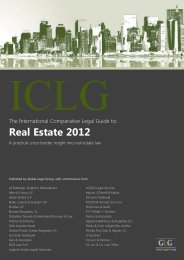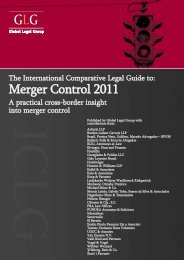Printable file (PDF) - Schoenherr
Printable file (PDF) - Schoenherr
Printable file (PDF) - Schoenherr
You also want an ePaper? Increase the reach of your titles
YUMPU automatically turns print PDFs into web optimized ePapers that Google loves.
uk (bribery act)<br />
Can the donor of the benefit show active repentance in order to<br />
abandon the offence and go without punishment? (e.g., if they<br />
report themselves to the authorities and prevent the anticipated<br />
act of the official) (Tätige Reue)<br />
Repentance or self-reporting is not per se a defence to a corruption<br />
offence under UK law. However, the UK Serious Fraud Office (SFO)<br />
is encouraging self-reporting. Pursuant to one of its guidelines a<br />
company might be subject to a civil penalty (an agreed civil recovery<br />
order under Part 5 of the Proceeds of Crime Act 2002) rather than<br />
a criminal prosecution if they self-report and cooperate. However,<br />
this is not a guaranteed outcome and the SFO has said that in some<br />
circumstances (e.g. if board directors were involved in the corrupt<br />
conduct) it may prosecute even if a self-report is made. Therefore<br />
although companies are increasingly self-reporting it remains an important<br />
strategic decision to do so, as the consequences are not<br />
guaranteed.<br />
What are the maximum sanctions for bribery in the public sector?<br />
Ten years of imprisonment and/or unlimited monetary fines.<br />
2. Bribery in the private sector<br />
Active bribery: Is it an offence to bribe (i) employees, (ii) agents,<br />
or (iii) shareholders/owners of private companies with the intention<br />
that they act or omit to act contrary to their duties?<br />
Yes.<br />
Active bribery: Is it an offence to bribe (i) employees, (ii) agents,<br />
or (iii) shareholders/owners of private companies with the intention<br />
that they act or omit to act in accordance with their duties?<br />
No, unless the briber knows or believes that the acceptance of the<br />
benefit would itself constitute the improper performance of a relevant<br />
function or activity, e.g., the receiver is prohibited from accepting<br />
the offered or promised benefit by written law, code of conduct<br />
or guidelines.<br />
Passive bribery: Is it an offence if (i) employees, (ii) agents, or<br />
(iii) shareholders/owners of private companies accept advantages<br />
in exchange for an act or the omission of an act contrary<br />
to their duties?<br />
Yes.<br />
www.schoenherr.eu<br />
149








